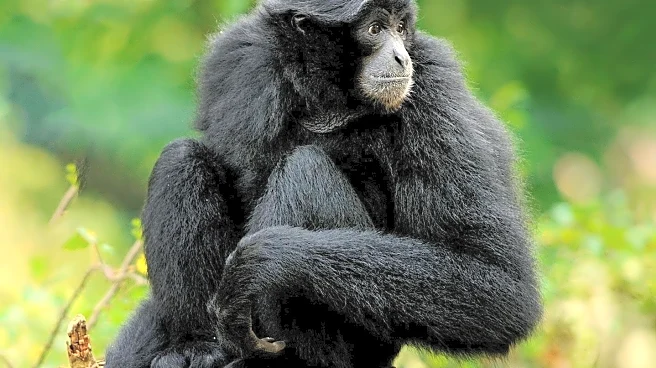What's Happening?
Jane Goodall, a leading figure in conservation and primate research, has died at the age of 91. Her death was announced by the Jane Goodall Institute, which she founded in 1977 to study and protect primates and their habitats. Goodall began her groundbreaking research on chimpanzees in Tanzania in 1960, making significant discoveries about their behavior and social structures. Over her 65-year career, she became an outspoken advocate for environmental protection, addressing issues such as climate change, poaching, and habitat destruction. Goodall's institute has expanded its mission to include community health initiatives and efforts to protect other species, such as whales.
Why It's Important?
Jane Goodall's work has transformed the scientific understanding of primates and highlighted the urgent need for conservation efforts. Her research demonstrated the complex social behaviors of chimpanzees, challenging the notion of human uniqueness. Goodall's advocacy has raised awareness about the threats facing wildlife and the environment, influencing public policy and conservation strategies. Her institute's initiatives have empowered communities and young people to engage in environmental protection, fostering a global movement for sustainable practices. Goodall's legacy continues to inspire efforts to preserve biodiversity and address ecological challenges.
What's Next?
The Jane Goodall Institute is likely to continue its conservation and advocacy work, building on Goodall's legacy. The institute may expand its initiatives to address emerging environmental issues and collaborate with other organizations to enhance conservation efforts. Goodall's passing may prompt tributes and reflections from the scientific and environmental communities, potentially leading to renewed focus on primate research and habitat preservation. Stakeholders may also explore ways to honor Goodall's contributions through educational programs and conservation projects.
Beyond the Headlines
Goodall's work has ethical implications, challenging traditional views on animal intelligence and behavior. Her approach to conservation emphasized empathy and respect for all living beings, advocating for ethical treatment of animals in research and captivity. Goodall's legacy may influence future conservation policies and inspire a cultural shift towards greater environmental responsibility. Her life's work underscores the importance of preserving biodiversity and fostering a sustainable relationship with the natural world.









